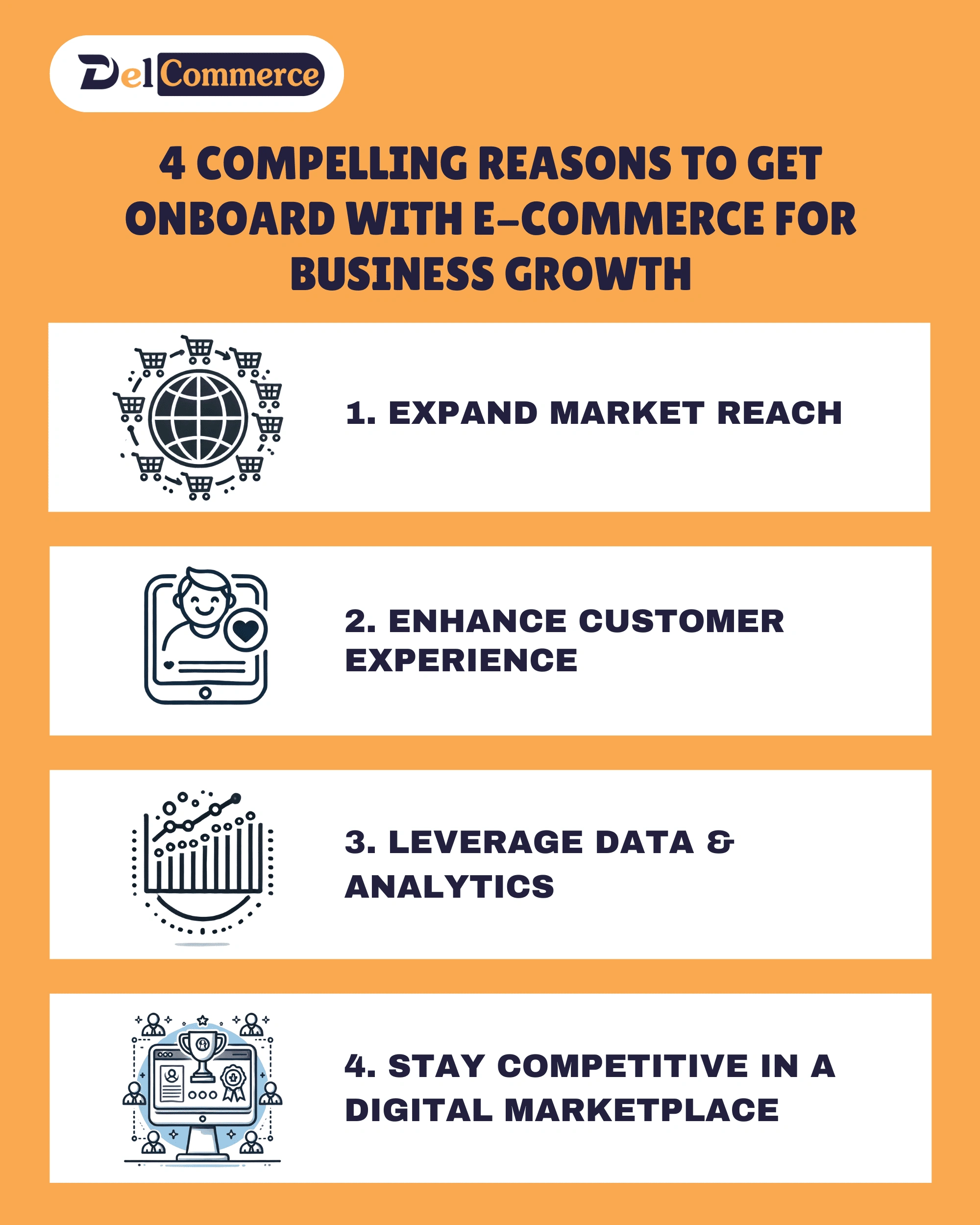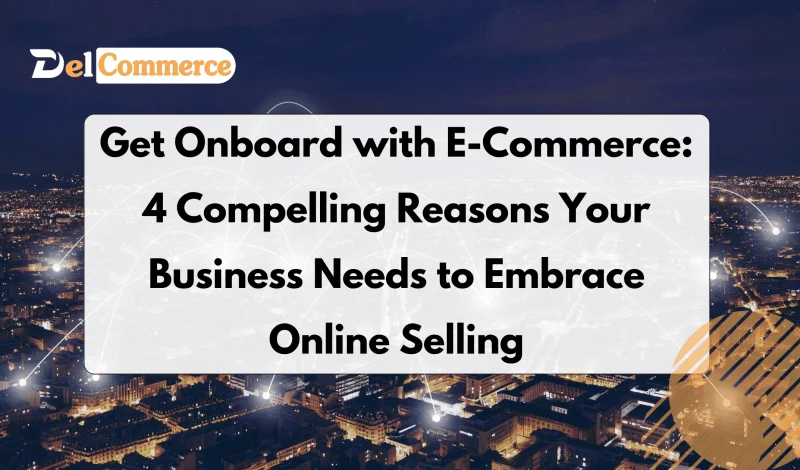In today’s rapidly evolving digital world, businesses face a constant challenge: staying relevant and competitive. As consumer behavior continues to shift towards online shopping, the importance of having a strong e-commerce presence cannot be overstated. E-commerce isn’t just a trend; it’s a powerful tool that allows businesses to thrive in a digital-first marketplace. In this comprehensive guide, we’ll explore four compelling reasons why you need to get onboard with e-commerce to ensure the growth and sustainability of your business.

1. Expand Your Market Reach Beyond Traditional Boundaries
One of the most compelling reasons to get onboard with e-commerce is the ability to expand your market reach far beyond the limitations of a physical store. Traditional brick-and-mortar businesses are typically restricted by their geographic location. However, an e-commerce platform breaks down these barriers, enabling your business to reach customers across the globe.
Imagine a small, locally owned boutique that specializes in handcrafted jewelry. Before the advent of e-commerce, this business would have been limited to serving customers in its immediate area. However, with a well-designed online store, this boutique can now attract customers from around the world, offering them the opportunity to purchase unique, high-quality products that they would otherwise never have encountered.
Moreover, e-commerce platforms are accessible 24/7, providing potential customers with the convenience of shopping at any time that suits them. This around-the-clock availability significantly increases your business’s visibility and sales potential. For example, while your physical store might close at 6 PM, your online store continues to serve customers well into the night, including those in different time zones.
Additionally, advancements in logistics and international shipping mean that businesses can now deliver products to customers almost anywhere in the world. Partnering with reliable shipping companies ensures that your products reach your customers promptly and safely, further enhancing your brand’s reputation and customer satisfaction.
2. Enhance Customer Experience Through Convenience and Personalization
Customer experience is a critical factor in driving business success, and e-commerce platforms excel in offering unparalleled convenience and personalization. In the fast-paced modern world, consumers increasingly value convenience, and they’re more likely to engage with businesses that make their shopping experience easy and enjoyable.
E-commerce platforms provide customers with the ability to browse and shop at their own pace, without the pressure of in-store shopping. They can easily compare products, read reviews, and make informed purchasing decisions from the comfort of their homes. This level of convenience is a key reason why more consumers are choosing to shop online.
Furthermore, e-commerce platforms offer robust personalization features that can significantly enhance the shopping experience. By analyzing customer data, such as browsing history and past purchases, businesses can tailor their offerings to meet individual preferences. For instance, an online fashion retailer can recommend clothing items that align with a customer’s style, or suggest complementary products based on previous purchases. This level of personalization not only improves customer satisfaction but also increases the likelihood of repeat purchases.
Additionally, e-commerce allows businesses to offer a variety of payment options, catering to the diverse preferences of their customers. Whether it’s credit cards, digital wallets, or buy-now-pay-later services, providing flexible payment options can significantly enhance the customer experience and reduce cart abandonment rates.
Incorporating customer feedback into your e-commerce strategy is another way to improve the shopping experience. Online reviews and testimonials provide valuable insights into what your customers love about your products and where there’s room for improvement. By actively listening to your customers and making adjustments based on their feedback, you can foster loyalty and build a strong, customer-centric brand.
3. Leverage Data and Analytics for Informed Decision-Making
In the digital age, data is a powerful asset that can drive strategic decision-making and business growth. When you get onboard with e-commerce, you gain access to a wealth of data that can provide deep insights into customer behavior, preferences, and purchasing trends.
E-commerce platforms are equipped with robust analytics tools that allow you to track a wide range of metrics, from website traffic and conversion rates to average order value and customer lifetime value. By analyzing this data, you can identify which products are most popular, which marketing campaigns are driving the most sales, and where there might be opportunities for improvement.
For example, if your data shows that a particular product is frequently viewed but rarely purchased, this could indicate an issue with the product’s pricing, description, or images. Armed with this information, you can make targeted adjustments to improve the product’s appeal and increase conversions.
Moreover, e-commerce analytics can help you segment your customer base and create targeted marketing campaigns. By understanding the demographics, preferences, and behaviors of different customer segments, you can tailor your messaging to resonate more effectively with each group. For instance, you might discover that younger customers prefer environmentally-friendly products, prompting you to highlight the sustainable aspects of your offerings in your marketing materials.
Another significant advantage of e-commerce data is its ability to inform inventory management. By analyzing sales data, you can identify trends and make more accurate forecasts, ensuring that you have the right products in stock at the right time. This not only helps prevent stockouts and overstocking but also optimizes your supply chain and reduces costs.
Furthermore, integrating e-commerce data with Customer Relationship Management (CRM) systems allows you to gain a comprehensive view of your customers. This holistic approach enables you to provide personalized customer service, manage interactions more effectively, and build stronger relationships.
4. Stay Competitive in an Increasingly Digital Marketplace
The business landscape is becoming increasingly digital, and having an e-commerce presence is essential to staying competitive. With more consumers turning to online shopping, businesses that fail to get onboard with e-commerce risk falling behind their competitors.
E-commerce provides the flexibility and scalability needed to adapt to changing market conditions. For example, during peak shopping seasons or promotional events, you can quickly scale your online operations to handle increased traffic and demand. This level of agility is difficult to achieve with a physical storefront alone.
Moreover, e-commerce platforms offer a range of tools and features that can help you implement innovative marketing strategies. From search engine optimization (SEO) to social media integration, these tools allow you to reach your target audience more effectively and drive traffic to your online store.
For instance, by optimizing your e-commerce site for search engines, you can improve your visibility in search results and attract more organic traffic. This involves using relevant keywords (such as “get onboard with e-commerce”), creating high-quality content, and ensuring that your website is fast, mobile-friendly, and easy to navigate. Additionally, e-commerce platforms often integrate with social media channels, enabling you to leverage social commerce and reach customers where they spend the most time.
Staying competitive also means continuously innovating and offering value-added services that set your business apart. For example, you could introduce a subscription service, allowing customers to receive their favorite products regularly without having to place a new order each time. This not only provides convenience but also fosters long-term customer loyalty.
E-commerce also offers opportunities to implement data-driven marketing strategies, such as personalized email campaigns, retargeting ads, and loyalty programs. By leveraging the data collected from your e-commerce platform, you can create targeted campaigns that resonate with your audience and drive conversions.
In addition, e-commerce platforms provide valuable tools for customer engagement and retention. Features like live chat, automated email follow-ups, and personalized product recommendations help keep customers engaged and encourage repeat business.
Conclusion
In conclusion, the decision to get onboard with e-commerce is one of the most impactful moves you can make for your business. By expanding your market reach, enhancing customer experience, leveraging data for informed decision-making, and staying competitive in a digital-first world, you position your business for long-term success and growth.
E-commerce is not just a passing trend; it’s the future of business. As the digital landscape continues to evolve, businesses that embrace e-commerce will be better equipped to meet the demands of modern consumers and thrive in an increasingly competitive marketplace.
So, if you haven’t yet embraced e-commerce, now is the time to take the plunge. Get onboard with e-commerce and unlock new opportunities for your business. With the right strategy and tools, you can transform your business and achieve new levels of success.



